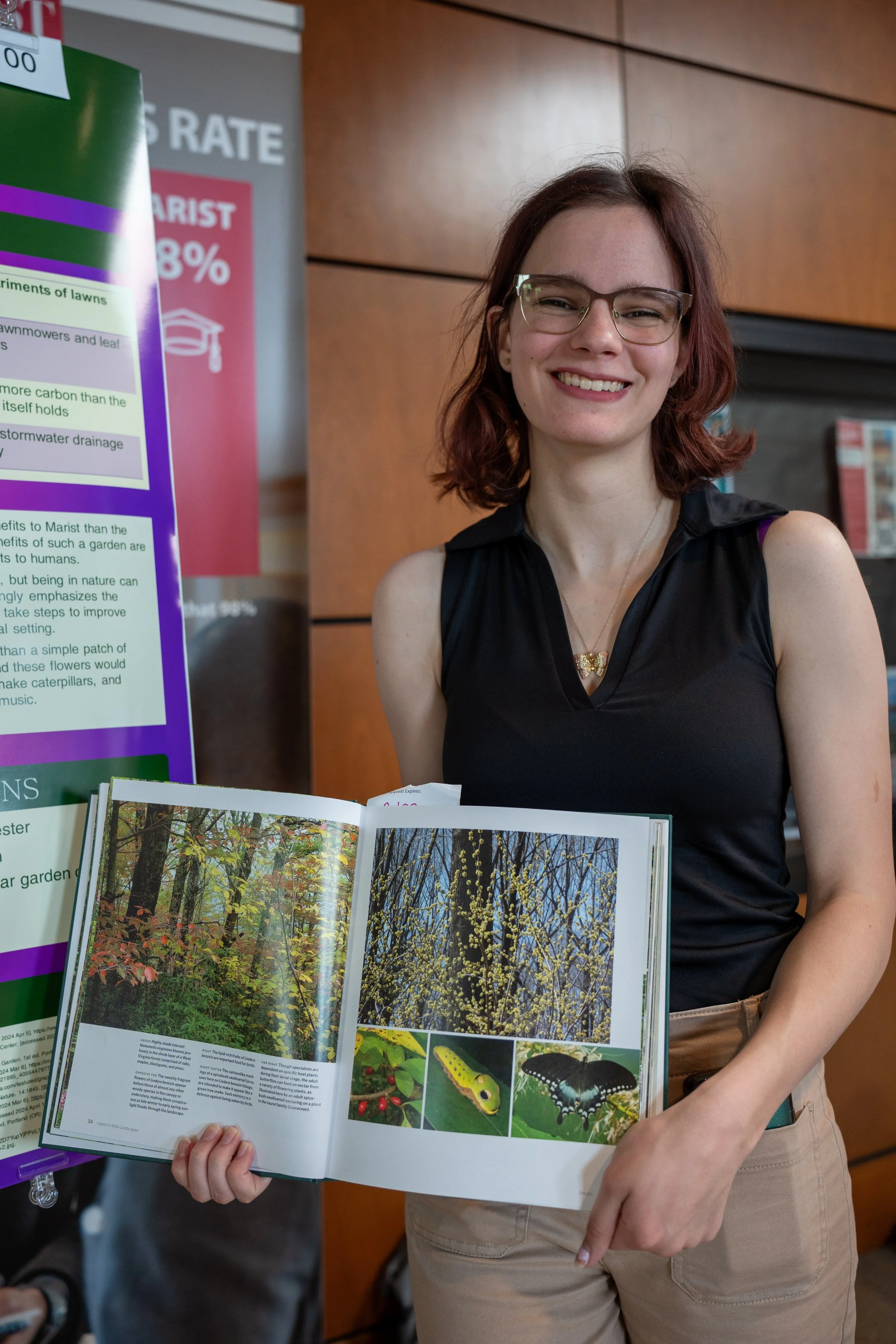Bushes and Butterflies
STORY By Laratee Vannieuwenhuyze
Spending time outside surrounded by gorgeous plants and flowers continuously in bloom while doing homework sounds like the perfect pastime for college students. But what nature are students here at Marist College meant to enjoy on a campus with isolated, interspersed trees in a vast ocean of too-frequently cut grass?
Cecelia Campbell ‘27 may have the answer to such a problem.
Only a freshman, the Maryland native started making her mark on the Marist community during her first semester, thanks to an interest she researched and pursued in her first-year seminar class on environmental studies.
Her interest: How can Marist College add native pollinator gardens to the campus’ grounds?
“I've noticed that on campus, there is a lot of flat grass and just flat lawn space. And I wanted to find a way to reduce that,” shared Campbell, recounting how the lack of biodiversity on campus shocked her upon arrival. She had never toured the campus before applying and attending orientation and classes.
Her decision to base her term project on the issue was solidified by the appearance of Robin Wall Kimmerer, scientist and author of Marist’s 2023-2024 Common Read, “Braiding Sweetgrass.”
“When [Kimmerer] came to this school and did her presentation, she mentioned how there was a lot of open space here, so I thought, ‘I’m doing that. I noticed that.’”
Native pollinator gardens like the ones Campbell is researching to implement on campus are designed to use native species of flora to attract and support pollinators, including bees, butterflies, and hummingbirds. Simply put, they are a perfect way to restore a lively, biodiverse ecosystem to an otherwise lacking area.
Campbell’s thorough research and heartfelt dedication to the project allowed her to continue her research after her first semester. She worked alongside Dr. Richard S. Feldman, her first-year seminar professor and chair of the environmental science & policy department.
Dr. Feldman has acted as her mentor and advisor through this process, meeting weekly to discuss the research done between meetings and acting as a guide throughout the process for Campbell’s needs.
“It feels nice to know that [Dr. Feldman] believes in me and that I can actually make Marist a better place,” said Campbell.
Illustration by Francine Wooley
Her desire to bring more biodiversity stems from her love of gardening, a trait and hobby that her parents and grandmother fostered. Ever since she was a child, Campbell has been surrounded by gardens and a love for what nature holds, whether it is pretty flowers or vegetables to eat for dinner.
“When I was about 16, my dad expanded the garden, so I had my own section all to myself; that was really nice for just experimenting with what I could grow there, finding new foods and ending up with way too much Swiss chard,” recounted Campbell.
Contrary to what one may believe, Campbell did not come to Marist to focus her studies and research efforts on environmental studies. Instead, she chose to set herself on the communications path with a dual concentration in advertising and journalism, backed up by a minor in theatre.
“I knew I wanted to be a communications major because I like talking… that's kind of my thing,” said Campbell.
But her path has wavered after incorporating her love of science into her daily life at Marist.
“I waffled over changing my major entirely. But after talking to Dr. Feldman again, he told me that next semester, they're going to be tweaking their environmental studies major to make it way easier for someone to double major,” shared Campbell. “So [there’s a chance] I'll do that.”
She always had an inkling that communications would be part of her future since middle school, but by putting her efforts into another area she truly cares about, Campbell sees as another door opening for her future.
“I would love to do science communications as a career path,” said Campbell. “It's a very relevant field right now with climate change.”
The work that Campbell has been doing alongside her regular coursework has been a distraction for her since researching a topic that is a personal passion is much more fulfilling than essay after essay, no matter if it can be overwhelming.
“Honestly, the way that I work, I will latch onto the project and just…knock it out in like, one long session rather than a lot of little sessions…But I guess the plants' list did take a little longer because it was a lot of cross-referencing different databases,” Campbell said.
Once she’s down a rabbit hole on a topic she enjoys, like finding the perfect flowers and plants for these potential native pollinator gardens, the distractions of the project become far more interesting than an essay for a random class - even if it means turning her known world upside down.
“I’ll go down rabbit holes and get distracted. Like, there’s a plant that I know as Mountain Laurel, but what’s actually more commonly known as Mountain Laurel is a completely different plant. So I kind of had a culture shock-kind of a moment.”
She hopes to one day see the fruits of her labor and native pollinator gardens implemented across Marist’s campus, regardless of how overwhelming her research may become because, for Campbell, “It's probably the most important thing I'm doing right now.”
Photography by Christopher C. Smith
Video by Max Hochberg, Rose Mayer and Christopher C. Smith


